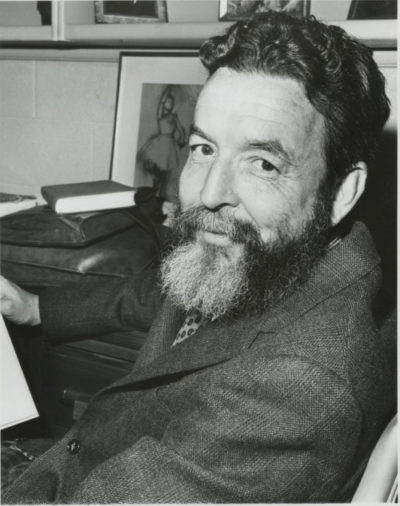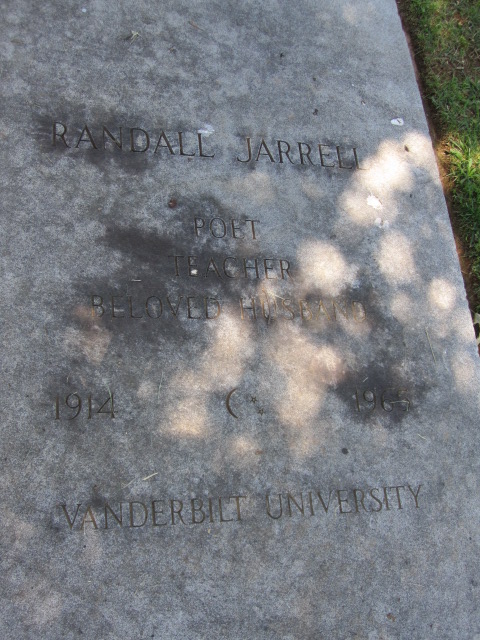Randall Jarrell (Randall Jarrell)

Randall Jarrell went on to teach at the University of Texas at Austin from 1939 to 1942, where he began to publish criticism and where he met his first wife, Mackie Langham. In 1942 he left the university to join the United States Army Air Forces. According to his obituary, he “[started] as a flying cadet, [then] he later became a celestial navigation tower operator, a job title he considered the most poetic in the Air Force.” His early poetry would focus on the subject of his war-time experiences in the Air Force. The Randall Jarrell obituary goes on to state that “after being discharged from the service he joined the faculty of Sarah Lawrence College in Bronxville, N.Y., for a year. During his time in New York, he also served as the temporary book review editor for The Nation magazine.” However, Jarrell was uncomfortable living in the city and “claimed to hate New York’s crowds, high cost of living, status-conscious sociability, and lack of greenery.” He didn’t end up staying in the city for long. Instead, he left for the Woman’s College of the University of North Carolina where, as an associate professor of English, he taught modern poetry and “imaginative writing.”
Randall Jarrell divorced his first wife and married Mary von Schrader, a young woman whom he met at a summer writer’s conference in Colorado, in 1952. They first lived together while Jarrell was teaching for a term at the University of Illinois at Champaign-Urbana. Then the couple settled back in Greensboro with Mary’s daughters from her previous marriage. The couple also moved temporarily to Washington D.C. in 1956 when Jarrell served as the consultant in poetry at the Library of Congress (a position that later became titled “Poet Laureate”) for two years, returning to Greensboro and the University of North Carolina after his term ended. Towards the end of his life, in 1963, Stephen Burt notes, “Randall’s behavior began to change. Approaching his fiftieth birthday, he seems to have worried deeply about his advancing age. . . After President Kennedy was shot, Randall spent days in front of the television weeping. Sad to the point of inertia, Randall sought help from a Cincinnati psychiatrist, who prescribed [the antidepressant drug] Elavil.” The drug made him manic and in 1965, he was hospitalized and taken off Elavil. At this point, he was no longer manic, but he became depressed again. Burt also states, “In April The New York Times published a viciously condescending review of [Jarrell’s most recent book of poems] The Lost World. Soon afterwards, Jarrell slashed a wrist and returned to the hospital.” After leaving the hospital, he stayed at home that summer under his wife’s care and returned to teaching at the University of North Carolina that fall.
Then, near dusk on October 14, 1965, while walking along U.S. highway 15-501 near Chapel Hill, N.C., where he had gone seeking medical treatment, Randall Jarrell was struck by a car and killed. In trying to determine the cause of death, “[Jarrell’s wife] Mary, the police, the coroner, and ultimately the state of North Carolina judged his death accidental, a verdict made credible by his apparent improvements in health. . .and the odd, sidelong manner of the collision; medical professionals judged the injuries consistent with an accident and not with suicide.” Nevertheless, because Jarrell had recently been treated for mental illness and a previous suicide attempt, some of the people closest to him weren’t entirely convinced that his death was accidental and suspected that he might have committed suicide. In a letter to Elizabeth Bishop about a week after Jarrell’s death, Robert Lowell wrote, “There’s a small chance [that Jarrell’s death] was an accident. . . [but] I think it was suicide, and so does everyone else, who knew him well.” Jarrell’s death being a suicide has since become accepted practically as fact, even by people who were not personally close to him. The idea has been perpetuated by some well known writers. A. Alvarez, in his book The Savage God, lists Jarrell as a twentieth-century writer who killed himself, and James Atlas refers to Jarrell’s “suicide” multiple times in his biography of Delmore Schwartz. The idea of Jarrell’s death being a suicide was always denied by his wife.
Born
- May, 06, 1914
- USA
- Nashville, Tennessee
Died
- October, 14, 1965
- USA
- Chapel Hill, North Carolina
Cause of Death
- struck by car
Cemetery
- New Garden Friends Cemetery
- Greensboro, North Carolina
- USA



